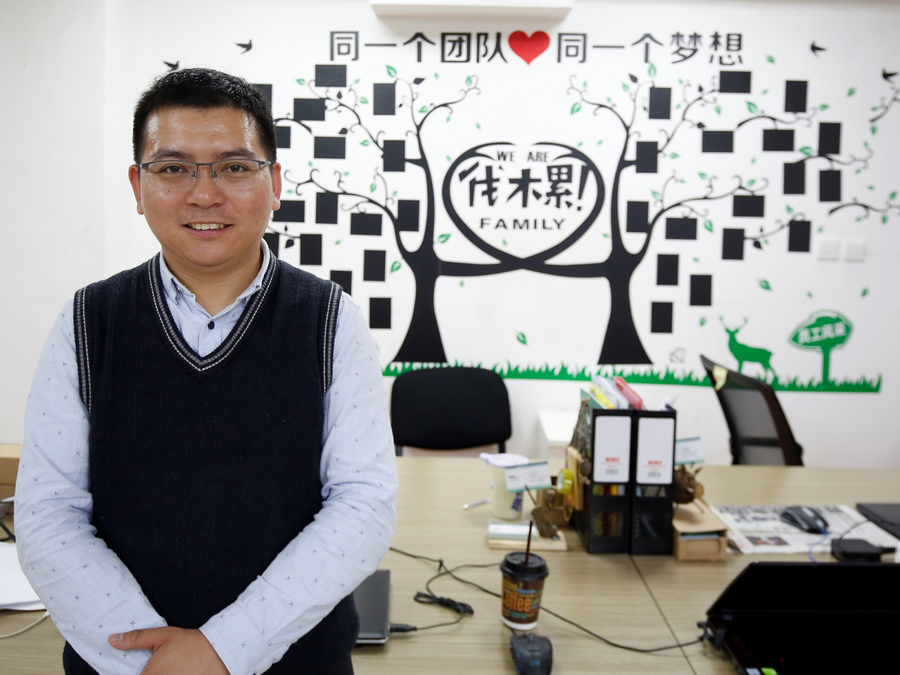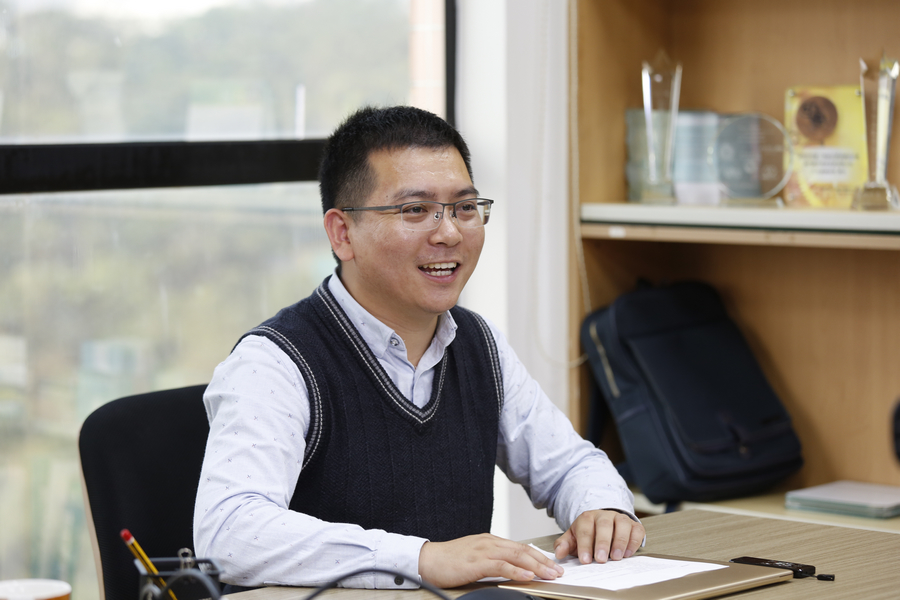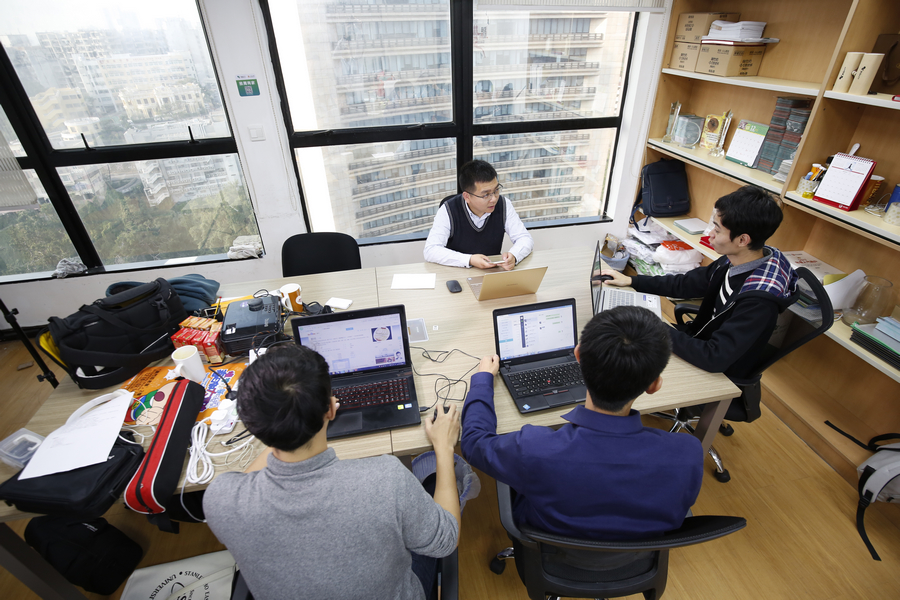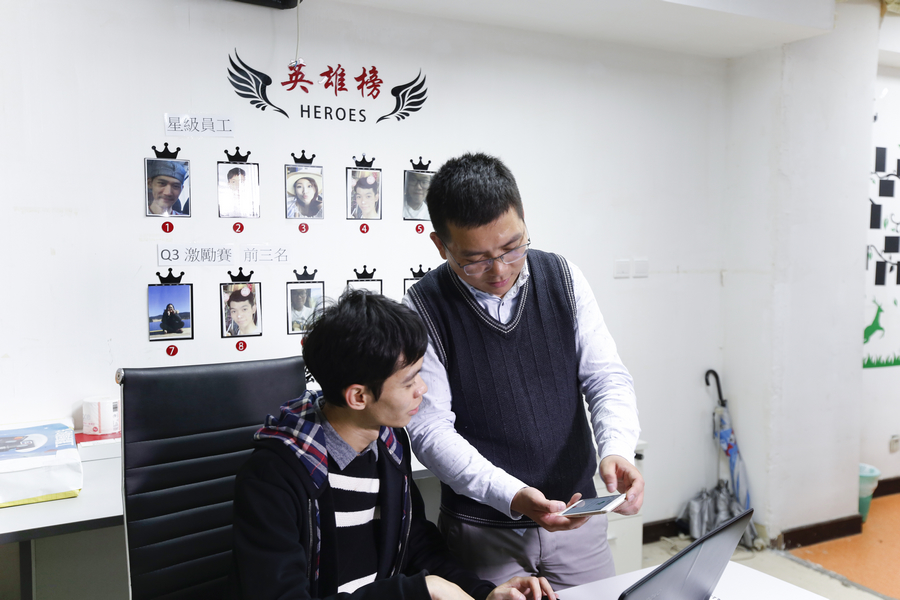Source: My UM
In recent years, the Macao SAR government is actively encouraging young people to start their own businesses. Many have responded to this call. But how does a newcomer survive the fierce competition in the marketplace? Jiang Haitao, a UM alumnus who has changed his career paths three times, has the answer. ‘To start a business, one must be able to weather the storm,’ he says. ‘The world is constantly changing, and a company’s mode of operation must adapt to the change.’
Stumbling Upon a Business Opportunity
Jiang’s office is dominated by a large desk formed by four regular desks. This is where Aomi, the first dining, shopping, and entertainment application in Macao, was born. With all his colleagues in their 20s, Jiang, who is currently in his early 30s, is the oldest in his company. He has decided to forgo his own office because he believes sitting next to his colleagues facilitates work and communication.
Single-handedly developed by Jiang, Aomi has now become one of the most popular applications in Macao. Looking back, Jiang says the past seven years have not been all smooth sailing. In 2011, Jiang resigned from a stable bank job that he had held for four years in order to pursue further education and start his own business. ‘When I first started the company, I never thought about focusing on e-commerce platforms; instead I decided to focus on third-party wealth management and financial training, which I was familiar with,’ he says. ‘In 2012, I was inspired by my conversation with a friend who was working at Tencent about the business opportunities created by WeChat, and decided to explore that area. Later I managed to establish and maintain WeChat service platforms for some government departments and companies in Macao. That was when I started doing business in mobile internet.’
Starting a Business and Pursuing Further Studies Simultaneously
During the early days when he was preparing to start a company, Jiang would work hard during the day and attend classes at UM at night, where he would share the problems he encountered in the process with his teachers and classmates. ‘When I first started, I didn’t have a clear idea about what to do. Most of my classmates were in management positions in big- and medium-sized companies, so I thought I could learn some managerial experience from them,’ he says. Because of his busy work schedule, Jiang spent five years completing his master’s studies. ‘The biggest gain from studying at UM is that I learned to think as a businessman. There were many case studies in the textbooks, although many of the companies in the case studies no longer exist,’ he says. ‘But in my experience, the greatest value of case studies during master’s studies lies in learning the different ways of thinking of different companies. It taught me how to break a big problem into manageable bite-sized small problems in order to solve it. ’
Changing Career Paths Several Times
In 2014, Dianping, a food review website in mainland China, and Meituan, an online shopping, dining and entertainment application in mainland China, were looking to expand to the overseas market. Jiang seized the opportunity and became the Macao agent for both. He then started working with medium- and big-sized restaurants in Macao, and in the process he found that the discounts offered by many local restaurants could only be enjoyed by mainland customers, because Macao residents rarely used these two platforms. Feeling the situation was unreasonable, he had the idea of launching a similar platform in Macao. Now the focus of his business has shifted from the WeChat platform to the e-commerce platform. When Aomi was launched at the end of 2015, it immediately attracted more than 100 merchants.
Many entrepreneurs are daring and enjoy taking risks. Not Jiang. He is the type who would, as an old Chinese saying puts it, ‘never fight a battle unless he is sure he can win’. He is also quick to sniff out a business opportunity. ‘From June 2016 to the end of 2016, my team did almost no promotion for Aomi,’ he says. ‘During the six months, we asked our friends to try out this application to help us improve it. We updated it almost every two weeks during that period, in order to make sure that when we officially launch the product, it would stable and user-friendly.’
Adapting to the Constantly Changing Marketplace
To stay competitive, one has to adjust the mode of operation and scope of service to adapt to the constantly changing marketplace. ‘The world is changing every minute of every day, so our mode of operation and scope of service must also change in order to adapt to the new circumstances,’ he says. Jiang’s company has branches in Beijing, Nanjing, Hangzhou, Zhuhai, and Macao, with only the Macao branch having a physical office. ‘We have an extremely heavy workload. One year of workload here is equal to two years of workload at other companies,’ he says. ‘It’s not hard to make money in Macao, and if making money were our primary concern, we wouldn’ t be doing this internet-intensive job. Those who choose to stay do so because of a shared vision and a sense of satisfaction from work.’ There is a ‘hero list’ on the wall of Jiang’s office. By listing out the star employees of the company, Jiang hopes to boost morale and motivate others to do better.
While in college, Jiang planned to work in a hotel after graduation. But as luck would have it, he eventually found a job in banking. When he was thinking about starting a business, he wanted to focus on third-party wealth management and financial planning, but ended up in e-commerce. Talking about these unexpected twists and turns in his professional life, he says, ‘We can’t resist change. When an opportunity comes, we must grab it. We must give our best effort in order to succeed.’ He encourages UM students who wish to pursue a career or start a business in the internet industry or e-commerce to seize every opportunity to work as interns in mainland companies before graduation. ‘Today, mobile internet companies in mainland China are world-leading. Working at these companies can help the students learn the most advanced technology, mode of operation, and managerial skills,’ he says. ‘However, they would probably learn more from a start-up than from a big established company, because big companies tend to suffer from over-segmentation.’




